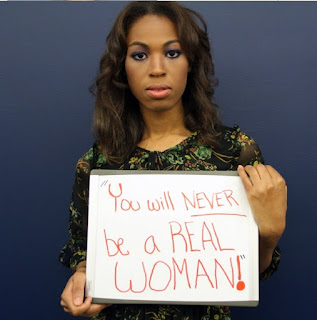What is a Microaggression Workshop and Should I Attend?
 |
| Trans woman holding a sign with a microaggression they have been told. |
Microaggressions: a term used for brief and commonplace daily verbal, behavioral, or environmental indignities, whether intentional or unintentional, that communicate hostile, derogatory, or negative prejudicial slights and insults toward any marginalized group.
I experience this regularly. From the, "you're the teacher?" to the "Wow! You are so well spoken." The issue with microaggressions is that they are difficult to prove which is why, they fit so nicely in our mock-post-racial-covert-racism society. Sometimes they immobilize us, trigger us, and cause us to freeze. So responding to them with a clever remark or shutting them down with some quick facts, just isn't an option. Microaggressions target marginalized groups like women, members of the LGBTQ community, people with disabilities, older adults, pregnant people, and people of color. Anyone that lives or works in a space that society has deemed "not your place," has probably encountered microaggressions on a daily basis.
When I cut my hair and was sporting a more outlier hairstyle, the microaggressions increased. This idea that I didn't look fem enough or masculine enough made people uncomfortable. We were discussing it on our podcast when my co host explained that they received the same backlash when they cut their hair. Listeners commented that microaggressions at work and school suck but what about the ones from home? The comments of, "Well, we can take a family picture once your hair grows out," or "men like long hair on a girl," stung too.
It opened up this conversation. While my last workshop, Equity & Justice, was targeted towards business professionals and educators I realized microaggressions need to be addressed in our personal lives, before we can really dive into them at work and inside of our classrooms. What makes us say these aggressive comments towards the ones we love? What tells us it's acceptable when it's friends or family?
I had a student not too long ago. This student was trans, FTM. He explained to me how his mother was fine with him transitioning as long as he "toned it down" when extended family came to visit. I've had gay friends explain that their family was okay with them bringing their boyfriend home for the holidays as long as they introduced them as their roommate or friend. Bisexual friends who are told, "if you like both why not just be straight? I just don't want your life to be hard." Even friends in interracial relationships whose parents explained, it was acceptable to have their fun but they could never marry this person. If this sounds like bigotry to you, you are correct. These off hand comments are meant to express hate or at the very least implicit bias but they are framed in such a way that they can be argued as caring.
If you have ever self-described yourself as chubby or curvy or a lot to love or even fat, you have most likely received the comment of, "I'm just concerned about your health." This microaggression is a downright lie. Commentators aren't truly concerned about your health, they are feeding the stereotype that healthy has one look and you can't possibly be healthy if you don't have that particular body type. Therefore they will shame you into losing weight even if you have to use extremely unhealthy methods to do so.
Living with a disability, whether mental or physical, can be debilitating but it does not make us any less human. The idea that people with physical disabilities are often spoken down to or even ignored is despicable. The fact that people with mental illness are often called "crazy" or simply the name of their disorder rather than their first name is deplorable. Turning disabilities into punchlines or ways to describe personality traits is a common microaggression that minimizes the very real struggle faced by members of this community. Saying, "I guess you can see, I'm pretty OCD," when describing how organized you are, or even saying "I'm so depressed," when you are slightly disappointed with the most recent remake of your favorite film, are not okay. However someone suffering from them may not feel comfortable correcting you every time. Many microaggressions don't rely on the victim to correct you as much as you stopping yourself from communicating in that way.
How many of us have sat at the dinner table surrounded by our nearest and dearest and felt attacked? They sat across from you with a smile on their face while they expressed, "when are you going to stop all this (insert hairstyle, sexual orientation, gender expression, physical feature etc. here) and get married?" You look around to see if anyone else is hearing this? Noticing how uncomfortable you are? How close you are to getting up and walking out? But everyone else is transfixed by the food on their plate or the game on the TV. And you think, if they are all fine maybe you should be too but you're not. This isn't all on you, you should have someone in your corner because sometimes they can say something, and be heard, when you can't. During the workshop we will talk about finding our allies and explaining what our expectations of them are. Step one, if they are your ally they should accompany you to this workshop.
If you are tired of letting these comments roll off your back, if you want a better understanding of how to react when you hear one, especially allies, join me November 3rd.

Comments
Post a Comment